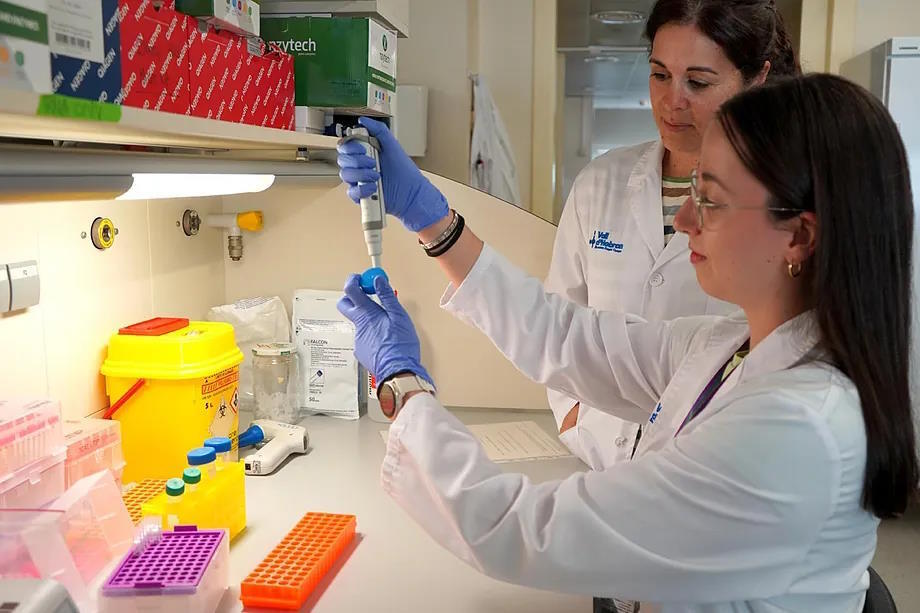One of the challenges pursued by HIV researchers is to understand how and why some people manage to deal with the infection without the need for treatment. They are known as elite controllers of HIV and are capable of controlling HIV replication without antiretrovirals. How do they achieve this?
The answer lies in their defenses. The alteration of the immune system is so specific that researchers are trying to find out how it happens. Lymphocytes, members of the body's army, are divided into three different types: B, T, and natural killer (NK) cells. These latter cells belong to the innate immune system and are part of the first line of defense against a wide range of pathogens. They provide protection against viral and bacterial infections and also help detect and limit the development of tumors.
A study by the Vall d'Hebron Research Institute (VHIR, linked to the hospital of the same name) in Barcelona has just put natural killer cells under the researchers' spotlight by describing their role in the phenomenon known as elite controllers. These patients are few in number, estimated at 1%, but they are very valuable in the search for a curative therapy.
The Infectious Diseases group at VHIR decided to investigate natural killer cells, unlike the majority of the scientific community, which is more focused on CD8 cells in elite controllers, whose immune system is very potent (NK cells are not T or B lymphocytes, nor do they have CD4 or CD8 markers).
And the team seems to have hit the nail on the head as they have discovered, according to an article published in the journal JCI Insight, that natural killer cells in elite controllers have a more specific response. Instead of acting indiscriminately, they can recognize and eliminate cells that have been marked with antibodies in a more targeted way.
What are the details of the natural killer cells' role?
They have also observed, through flow cytometry (which allows the analysis of multiple parameters in a cell using fluorescent antibodies) and other sophisticated laboratory techniques, that the natural killer cells of elite controllers have two markers on their surface, called NKG2C and NKG2A, which have opposite functions. While NKG2A decreases immune system activity, NKG2C acts as an activator.
"We believe that the fact that cells express both receptors makes the response more balanced and directed towards eliminating HIV-infected cells, and therefore, the response to the virus is stronger," reports María José Buzón Gómez, co-head of the Infectious Diseases group at VHIR and a researcher dedicated to studying new therapies aimed at curing HIV, with a special emphasis on characterizing new cellular HIV reservoirs in blood and different tissues, and developing strategies to enhance the immune system.
As she explained to this newspaper, NKG2A is a marker of more immature cells and NKG2C of more mature cells, and in their combination, the cell with maturity characteristics retracts and becomes more immature. "It is possible that elite controllers have more of these cells," she said. She also highlighted that genetic factors could be involved in these controllers, "but we have not identified them." This is where the HLA system (Human Leukocyte Antigen) could come into play, which plays a crucial role in the immune response and determines genetic susceptibility to various infectious diseases.
Comparing Four Groups of People
In their study, the Barcelona team compared natural killer cells from control individuals, people living with HIV with and without antiretroviral treatment, and elite controllers. The natural killer cells of the latter showed a "more specific, precise, and regulated response to the virus." Additionally, they have a greater ability to migrate to infected tissues and present memory cell markers. These markers allow cells to remember previous infections and react more quickly and effectively.
All of this is important because normally natural killer cells act in a nonspecific manner (they can kill any cell they detect as abnormal), but this study provides evidence that, in elite controllers, instead of acting indiscriminately, they are able to recognize and eliminate antibody-marked cells in a more targeted way.
"Understanding the role of natural killer cells will help us create immunotherapy tools aimed at enhancing beneficial responses to control virus replication. Our goal is to obtain better therapies for people living with HIV and, in the future, achieve complete cure," Buzón stated.
The Infectious Diseases group at VHIR is already working on identifying the mechanism by which elite controllers' NK cells are more antiviral and "kill better," as well as on the generation of more activated NK cells in animal models, either by using drugs that can directly modify the response of these cells or by modifying them outside the body.
This could lead to a specific cellular therapy aimed at enabling patients who are not natural elite controllers of HIV to become so. Such an NK-based therapy could also be useful in oncology, according to Buzón, because "NK cells also kill tumor cells."
The work published now has been carried out in collaboration with the Health Research Institute - Jiménez Díaz Foundation and the Rey Juan Carlos University Hospital in Madrid, and the Biomedicine Institute of Seville (IBiS), and has been made possible thanks to funding from the Ministry of Science, Innovation, and Universities. Buzón has indicated that they are seeking more funding to continue this line of research.
